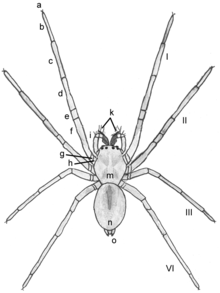- Cheiracanthium
-
Yellow sac spider 
C. mildei Scientific classification Kingdom: Animalia Phylum: Arthropoda Class: Arachnida Order: Araneae Family: Miturgidae Genus: Cheiracanthium
C. L. Koch, 1839Species C. inclusum
C. japonicum
C. lawrencei
C. mildei
C. mordax
C. punctorium
C. socotrense
C. virescens
many moreDiversity 194 species Cheiracanthium is a genus of spiders in the Miturgidae family. Certain species are commonly known as the "yellow sac spider".
Contents
Description
Cheiracanthium are usually pale in colour, and have an abdomen that can range from yellow to beige. Both sexes range in size from 5 to 10 mm. Some yellow sac spiders are attracted to the smell of volatiles in gasoline.[1] An unusual double pipe configuration in the Mazda6 led to a recall of around 65,000 Mazda6 vehicles in the US, Canada, Mexico and Puerto Rico from the 2009-10 model years after it was found that yellow sac spiders were building nests in the fuel system of the vehicles.[2]
Distribution
Cheiracanthium is primarily an Old World genus, with many species found from northern Europe to Japan, from Southern Africa to India and Australia. The only known species in the New World are C. inclusum and C. mildei. While the former also occurs in Africa and Réunion, the latter is found in the Holarctic region and Argentina. They can also be found in the lower mainland of British Columbia, Canada [3]
Venom
Cheiracanthium venom is purportedly necrotic, and if it is necrotic, it could cause a small lesion in humans. However, the necrotic nature and severity of the spider's bite has been disputed.[4] Because of the possibly necrotic nature of the wound, MRSA infection is a danger and victims are advised to seek medical treatment. Painful bites may be incurred from such species as C. punctorium in Europe, C. mildei in Europe and North America, C. inclusum in the Americas, C. lawrencei in South Africa and C. japonicum in Japan.[5]
References
- ^ "Gas-loving spider prompts Mazda recall in U.S.". Reuters. March 4, 2011. http://www.reuters.com/article/2011/03/04/us-mazda-spiders-idUSTRE7231CP20110304.
- ^ "Spiders lead to Mazda recall". CNN Money. March 3, 2011. http://money.cnn.com/2011/03/03/autos/mazda6_spider_recall/index.htm.
- ^ Platnick 2007
- ^ Vetter RS, Isbister GK, Bush SP, Boutin LJ. (2006) Verified bites by yellow sac spiders (genus Cheiracanthium) in the United States and Australia: where is the necrosis? Am. J. Trop. Med. Hyg., 74(6), pp. 1043-1048
- ^ Natural History Museum: Exotic sac spider, Cheiracanthium
- Howell, W. Mike & Jenkins, Ronald L. (2004): Spiders of the US: A photographic guide. ISBN 0-536-75853-0
- Platnick, Norman I. (2007): The world spider catalog, version 8.0. American Museum of Natural History.

This spider–related article is a stub. You can help Wikipedia by expanding it.

